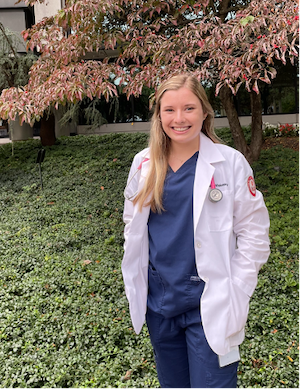Alexis Wislotsky '21

I am a 2021 graduate of the University of Scranton with a major in Neuroscience and a minor in Philosophy. I am currently a first-year physician assistant student at Salus University. As a graduate student, I can confidently say that the University of Scranton’s neuroscience program cultivated my love for science and provided a rich educational foundation.
The neuroscience program should pride themselves in their caring and intelligent faculty members. I am confident that I would not be where I am today if I didn’t have such amazing support from the faculty. Dr. Waldeck, the neuroscience program director invests time to get to know students in the program, and all the faculty mentors want to see students succeed in their aspirations both at Scranton and beyond.
A Passion for Research
Through getting to know the neuroscience faculty I was able to find a passion in research. I joined Dr. Orr’s biopsychology lab during my sophomore year where I was able to assist in a senior lab member’s project and present the research at the Society of Neuroscience in 2019. Research became a huge part of my life at Scranton, and I was able to develop an independent project for my Honor’s thesis, as well as assisting in projects conducted by my lab partners. Research not only instilled the importance of curiosity but prepared me to think outside the box when approached with a challenge.
Program Flexibility
The flexibility of the neuroscience program allowed me to complete the pre-requisites for PA programs, and still provided me room to take classes of personal interests. Classes such as Behavioral Neuroscience and Cellular Molecular Neuroscience set me far ahead compared to my classmates in PA school when learning about neural pathways and synapses.
I was able to be a teaching assistant for behavioral neuroscience lab, which allowed me to learn the brain structures more in-depth and make connections between classes I was taking throughout undergrad.
The background knowledge I gained at Scranton in the neuroscience and psychology classes was critical for understanding concepts in both anatomy and physiology classes in PA school. Additionally, the challenging biology and psychology classes instilled time management skills in undergrad which I utilize in PA school to balance a 22-credit load.
Lifelong Benefits
The Neuroscience program not only provided me with a rich education, but also provided me with life-long friendships and connections. I have fond memories of lab meetings, Scranton Neuroscience Society, and outreach programs that the neuroscience program held in the Scranton community.
I was nervous to begin PA school because of the rigorous course load. PA school does require an adjustment in studying skills, but the neuroscience program prepared me with a basis of knowledge for the material I am learning. Looking back, I am thankful I chose the University of Scranton’s neuroscience major because it adequately prepared me for PA school and was vital in my personal and professional growth.





